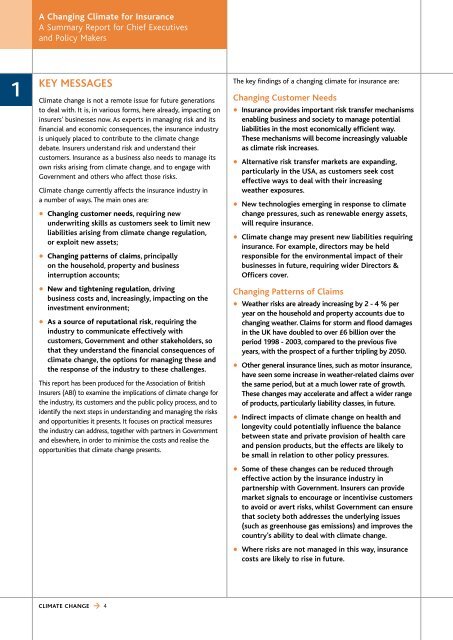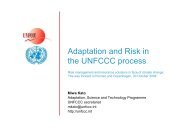9146 Depolarisation_6 - Munich Climate-Insurance Initiative
9146 Depolarisation_6 - Munich Climate-Insurance Initiative
9146 Depolarisation_6 - Munich Climate-Insurance Initiative
You also want an ePaper? Increase the reach of your titles
YUMPU automatically turns print PDFs into web optimized ePapers that Google loves.
A Changing <strong>Climate</strong> for <strong>Insurance</strong><br />
A Summary Report for Chief Executives<br />
and Policy Makers<br />
1<br />
KEY MESSAGES<br />
<strong>Climate</strong> change is not a remote issue for future generations<br />
to deal with. It is, in various forms, here already, impacting on<br />
insurers' businesses now. As experts in managing risk and its<br />
financial and economic consequences, the insurance industry<br />
is uniquely placed to contribute to the climate change<br />
debate. Insurers understand risk and understand their<br />
customers. <strong>Insurance</strong> as a business also needs to manage its<br />
own risks arising from climate change, and to engage with<br />
Government and others who affect those risks.<br />
<strong>Climate</strong> change currently affects the insurance industry in<br />
a number of ways. The main ones are:<br />
•<br />
Changing customer needs, requiring new<br />
underwriting skills as customers seek to limit new<br />
liabilities arising from climate change regulation,<br />
or exploit new assets;<br />
•<br />
Changing patterns of claims, principally<br />
on the household, property and business<br />
interruption accounts;<br />
•<br />
New and tightening regulation, driving<br />
business costs and, increasingly, impacting on the<br />
investment environment;<br />
•<br />
As a source of reputational risk, requiring the<br />
industry to communicate effectively with<br />
customers, Government and other stakeholders, so<br />
that they understand the financial consequences of<br />
climate change, the options for managing these and<br />
the response of the industry to these challenges.<br />
This report has been produced for the Association of British<br />
Insurers (ABI) to examine the implications of climate change for<br />
the industry, its customers and the public policy process, and to<br />
identify the next steps in understanding and managing the risks<br />
and opportunities it presents. It focuses on practical measures<br />
the industry can address, together with partners in Government<br />
and elsewhere, in order to minimise the costs and realise the<br />
opportunities that climate change presents.<br />
The key findings of a changing climate for insurance are:<br />
Changing Customer Needs<br />
•<br />
<strong>Insurance</strong> provides important risk transfer mechanisms<br />
enabling business and society to manage potential<br />
liabilities in the most economically efficient way.<br />
These mechanisms will become increasingly valuable<br />
as climate risk increases.<br />
•<br />
Alternative risk transfer markets are expanding,<br />
particularly in the USA, as customers seek cost<br />
effective ways to deal with their increasing<br />
weather exposures.<br />
•<br />
New technologies emerging in response to climate<br />
change pressures, such as renewable energy assets,<br />
will require insurance.<br />
•<br />
<strong>Climate</strong> change may present new liabilities requiring<br />
insurance. For example, directors may be held<br />
responsible for the environmental impact of their<br />
businesses in future, requiring wider Directors &<br />
Officers cover.<br />
Changing Patterns of Claims<br />
• Weather risks are already increasing by 2 - 4 % per<br />
year on the household and property accounts due to<br />
changing weather. Claims for storm and flood damages<br />
in the UK have doubled to over £6 billion over the<br />
period 1998 - 2003, compared to the previous five<br />
years, with the prospect of a further tripling by 2050.<br />
•<br />
Other general insurance lines, such as motor insurance,<br />
have seen some increase in weather-related claims over<br />
the same period, but at a much lower rate of growth.<br />
These changes may accelerate and affect a wider range<br />
of products, particularly liability classes, in future.<br />
•<br />
Indirect impacts of climate change on health and<br />
longevity could potentially influence the balance<br />
between state and private provision of health care<br />
and pension products, but the effects are likely to<br />
be small in relation to other policy pressures.<br />
•<br />
Some of these changes can be reduced through<br />
effective action by the insurance industry in<br />
partnership with Government. Insurers can provide<br />
market signals to encourage or incentivise customers<br />
to avoid or avert risks, whilst Government can ensure<br />
that society both addresses the underlying issues<br />
(such as greenhouse gas emissions) and improves the<br />
country’s ability to deal with climate change.<br />
•<br />
Where risks are not managed in this way, insurance<br />
costs are likely to rise in future.<br />
CLIMATE CHANGE 4



